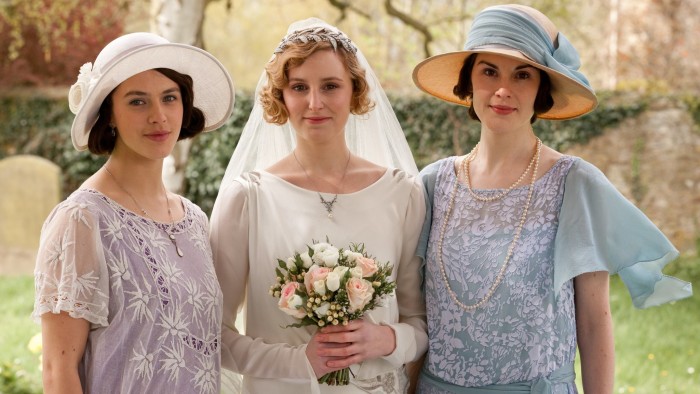The British aristocracy must solve its Downton Abbey problem
Roula Khalaf, Editor of the FT, selects her favourite stories in this weekly newsletter.

Should Lady Mary Crawley inherit Downton Abbey? If she could, of course, the plot of the television series would have lacked its main driver. The search for the distant male relation who is heir to the title and the estate that goes with it, and his welcome into the fold, is a familiar trope in literature from Jane Austen to Nancy Mitford and beyond.
But most people in the UK and outside it would be surprised to learn that, while landed estates are now often left to daughters as well as sons, the vast majority of aristocratic titles can still only be inherited by men. Sons, nephews and uncles take precedence over daughters, nieces and aunts when a title is passed on to the next generation. A female Earl of Grantham cannot be.
It is a strange anomaly in 21st-century Britain. If Prince George, Queen Elizabeth’s great-grandson, had been born Princess Georgina, she would be third in line to the throne, after a two-line bill was passed in 2013 that abolished a son’s right to the crown superseding his sisters’. But numerous attempts, via private bills, to abolish male primogeniture for hereditary titles and peerages have been unsuccessful.
Now five daughters of peers have taken their case to the European Court of Human Rights. They argue that because they cannot inherit their fathers’ titles, they are barred from taking seats in the House of Lords and that this breaches two articles of the European Convention on Human Rights, concerning gender discrimination and the right to a free and fair election.
The right for all hereditary peers to sit in the House of Lords was abolished in the late 1990s. Most of its 800 or so members are now life peers. However, there are still 92 hereditary peers. Only one is a woman, the Countess of Mar. When a hereditary peer dies or retires, his peers — excuse the pun — hold a by-election to choose a replacement.
Some would argue that the fact that women are barred from this process is an issue of little import. There is scant appetite for reform of the House of Lords and those who wish to do so are more likely to call for abolishing it entirely or, at least, the right of any hereditary peer to hold decision-making power over the country thanks to an accident of birth.
But it does matter. In a country that, in 2018, celebrated 100 years since women first began to get the vote, it is a bizarre throwback that aristocratic daughters do not have the same rights as their brothers. The tradition has been maintained even in the face of dramatic changes elsewhere in gender-related legislation. If, for example, you undergo gender reassignment as a woman, have a gender recognition certificate and a new birth certificate, you can legally become a man — except that you will still not inherit your father’s title.
Women are making slow but steady inroads into parliament, but they still represent just one-quarter of the House of Lords. To sequester a significant proportion of the seats in the upper house for men does not just perpetuate gender inequality, but also militates against the benefits to debate and decision-making that greater diversity brings. If a British business in 2019 said it was reserving an eighth of its jobs for men, it would be laughed out of court.
A decision to abolish male primogeniture would have repercussions beyond Westminster. Although the inheritance of land is now generally divorced from that of title, the tradition of passing it to sons rather than daughters persists. Although many landed estates are managed by women — think of the late Deborah, Duchess of Devonshire, at Chatsworth — it is mostly men who own them.
The only arguments against the abolition of male primogeniture appear to be the weight of tradition and some peers’ desire to maintain the comfortable status quo. Tradition has its appeal. But it is time this last bastion of state-sanctioned sexism gave way.
Comments